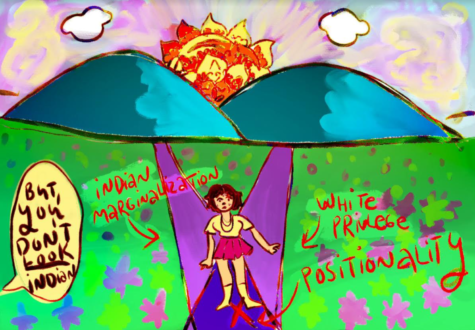ESSAY | “But wait, you don’t look Indian!”

As a cultural anthropology student, I have a tendency to analyze and abstract aspects of my own identity to better understand both my field and my place in the world.
I became especially reflective of the language I use to describe my experiences when I had a miscommunication with a well-intentioned white friend, who asked, “Why are you so invested in being half Indian? You sure don’t look Indian! Aren’t you basically white?”
It gave me cringe-worthy flashbacks of the user on Tumblr accusing me of cultural appropriation for wearing mehndi (henna) and then accusing me of being a “white b*tch faking my ethnicity for Tumblr clout” when I insisted I was with my Indian family when I got the henna done.
My mother is Punjabi, and my dad is white Appalachian with Scots-Irish origins. Even they were surprised when my father’s genes took over my phenotype — upon being handed a bright-red newborn, my mother wondered, “Whose white baby is this?!?”
On one hand, being half-desi has definitely influenced my experience.
I am frequently microaggressed, especially in my hometown Spanish Fort, Alabama. For three years I went to a suspiciously “selective” private school, in which the cultural pride my mother ingrained in me backfired in the form of racial bullying.
“Your mother should have never come to this country!” was a particularly memorable quote.
Also, I have a lot of interaction with that side of my culture. I am incredibly grateful that I was able to visit my family in India most summers during my childhood. Despite the fact that I was seen as an outsider/foreigner (well-intentioned selfie requests were common).
It was so fulfilling to learn about the rich, ancient heritage my family came from. I practice an eclectic spiritual practice heavily influenced by Hinduism and Buddhism. I want to focus my studies around South Asian religious practice and dynamics –– and I frequently use South Asian imagery, such as mandalas, in my art that I sell as a side hustle. It feels wrong to say it’s not a significant part of my life and how I view myself.
On the other hand, it would be disingenuous to downplay my privilege. I usually pass as white, though with a summer tan I also often pass as a mestiza Latina to others.
I walk through the world being perceived as a white person at first glance. I grew up watching how differently my mom was treated to me.
We were asked if she was my nanny sometimes; airport security assumed she was trafficking me, and once, she was harassed by a policeman for “looking undocumented.”
When I was about 9, I walked in on my mom sobbing, as the news played on the TV. A gurdwara, a Sikh place of worship, was attacked by a veteran.
“We have so many Sikh friends …” my mother muttered to herself. “Muslim too, and they don’t care about the difference.” I had to process at a young age that, because we looked different, I was inherently safer than my own mother.
So, how should I describe myself? Am I really just functionally white? Is “white-passing person of color” an oxymoron?
I turn once again to my studies — Kirin Narayan, a white/South Asian anthropologist, argues that in the field, whether or not one is a “native, outsider, or Halfie,” all anthropologists educated in the West would be seen as an outsider because of other intersecting identities.
We all stand at the intersection of so many social dynamics: class, race, gender, sexuality, etc. all influence the way we live. In anthropology, the point at which we stand, in the middle of all of our intersecting identities, is our positionality.
At the end of the day, the reason that there is not much language to explain mixed experience is that our very existence upsets the constructed racial taxonomy.
I don’t consider myself particularly oppressed, especially in comparison to BIPOC. But, I think that all mixed race people feel a sense of isolation — it’s hard to process that you don’t fit into a box that everyone is supposed to fit into. At the same time, there’s something to be said about the beauty of mixed identity — all it takes is two people falling in love and having a baby for the construct to begin to crumble away.
Mixed race individuals have multiple cultures upon which to build their identity. I’m not just Indian. I’m not just Appalachian. I’m both and that’s pretty cool.
Your donation will support the student journalists of Tulane University. Your contribution will allow us to purchase equipment and cover our annual website hosting costs.



Jenny Kottler • Feb 10, 2022 at 4:20 pm
Enjoyed reading your story! I like that you recognize being both Indian and Appalachian is “pretty cool.” Your positive attitude about your uniqueness will hopefully inspire others . . . perhaps even stir a bit of wonder and envy. Curious, do you have the benefit of speaking your mother’s native language? If so, it will offer a powerful advantage in your future. Always take advantage of what makes you unique.